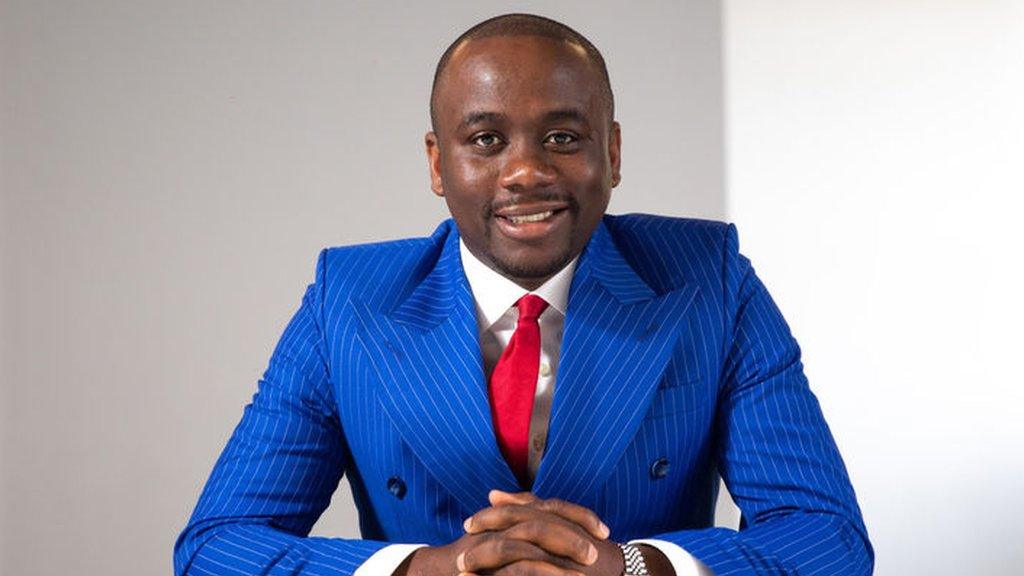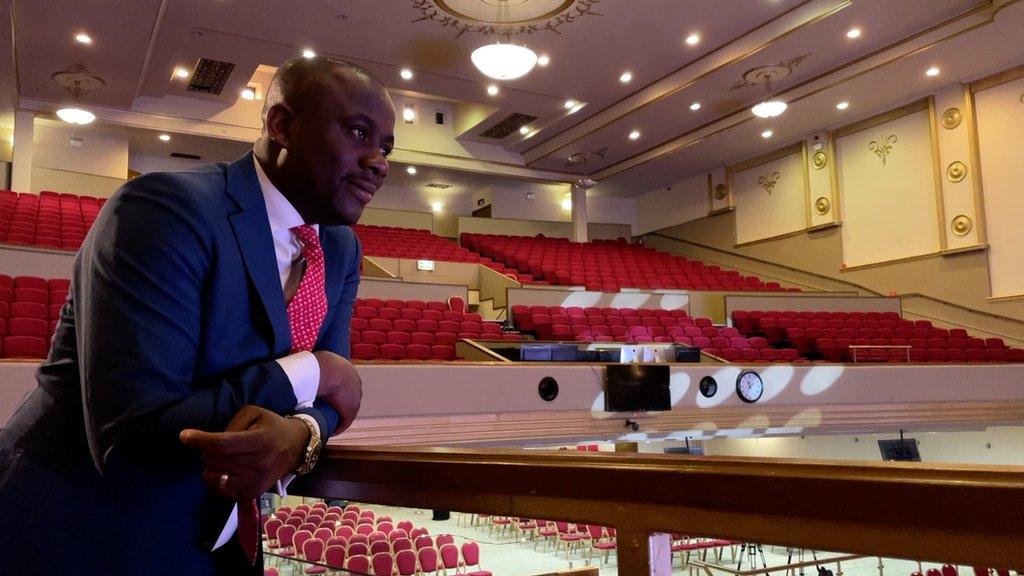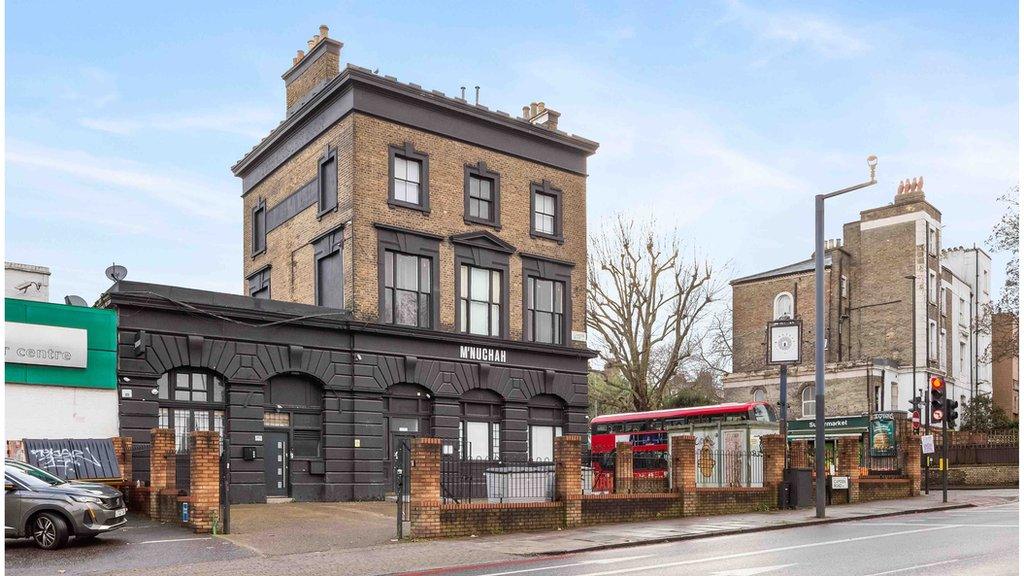'My journey from racist abuse at the tills to property tycoon'
- Published

Sanmi Adegoke didn't have any contacts in the world of property development when he started out in his career. In an industry where there are very few black CEOs, he found success as an outsider by exploiting the unique set of contacts he did have, building his own company from scratch.
Arriving in the UK from Nigeria as a teenager with his parents in the early 2000s, Sanmi Adegoke experienced racism early on.
In his first job, working at fast-food chain McDonald's in south London, he says some people would come up to him at the till and use racist slurs.
"Or sometimes they would say, 'Nah, I don't want you to serve me,'" he recalls. "And I had to live with that."
McDonald's had a zero-tolerance approach to these customers, but it was his Christian faith that gave him the strength to deal with the abuse. "I would say to these people, 'Jesus loves everybody - you are simply ignorant.'"
Mr Adegoke worked his way up at McDonald's, reaching a management position.


A colleague, who knew he was entrepreneurial, gave him a book that would have a lasting impact on him. Rich Dad, Poor Dad by Robert T Kiyosaki advocates investing in assets like real estate to get ahead in society.
Inspired, after graduating from university, he began investing in the UK property market, buying and selling flats off-plan from developers (before they were built).
Although he took a hit during the 2008 financial crisis, by 2013 he had made enough money to found his Rehoboth Property Group business.

Mr Adegoke says that the UK gave him many opportunities, like access to education
But the property business is very much about who you know.
"It's hard to get in if you don't have connections," explains Priya Aggarwal-Shah, founder and director of the BAME in Property organisation. "Networking opportunities come more easily to those from a certain background, who love golf, rugby, skiing and drinking, for example."
Since he still didn't have any contacts in the property development world, Mr Adegoke decided to exploit those contacts he did have - in the world of London's, black-majority faith communities.
In Nigeria he had attended a church group since the age of five, and when he came to London he joined an affiliated congregation.
There has been a steady decline in church attendance in the UK over the past few decades. The Church of England has gradually sold off many of its properties, including churches.
But south London bucks this trend, precisely because of immigrants like Mr Adegoke. There are reckoned to be more than 250 black-majority churches in south London with thousands of people worshipping every Sunday.
Mr Adegoke grew his business by renovating old entertainment spaces built after the war, and turning them into places where these congregations could worship.

Mr Adegoke's team renovated the Lighthouse venue in Camberwell, south London, in an early project
Early projects included turning a bingo hall in Camberwell, south London, and Woolwich Magistrates Court, into spaces for religious groups.
He then expanded his property empire to specialise in repurposing and renovating a more diverse mix of buildings, turning places like old pubs and police stations into co-working spaces, community halls and event spaces.
His Rehoboth group has now undertaken more than 20 major renovation projects and has £35m worth of property assets under its management, with more than 20 employees.
Mr Adegoke's success as a property CEO makes him something of an outlier. For many years the UK property industry has recognised it has an issue with diversity and promoting talent.
A report, external last year by the Action Sustainability consultancy found people from ethnic minority backgrounds made up 13.6% of the workforce for companies connected to the built environment. This was much better than the figure of 1.2% another major survey, external by the Royal Institution of Chartered Surveyors found in 2016, but still below the ONS benchmark figure of 18.5%.

Mr Adegoke's company helped to convert this pub in Camden, north London into a suite of apartments and event space
Representation has improved a lot recently, says Priya Aggarwal-Shah. But the industry is not good at retaining new talent and diversity falls off dramatically at CEO level, where many people share stories of microaggressions and an inability to fit in, she says.
Estates Gazette, which provides data and analysis for the commercial property market, found in its 2021 survey, external that 84% of respondents from ethnic minority backgrounds felt that racism was an issue at work, with 75% saying they had experienced it.
"We have this obsession with owning a home in this country and this symbolises the industry, because property is all about relationships," says Ms Aggarwal-Shah. "You are trusting people with such huge amounts of money, so our natural affinity bias kicks in - we want to work with people very similar to us."
She claims this is why many people from ethnic minority backgrounds working in the industry, like Mr Adegoke, end up starting their own property companies.
"My business dream was possible because I started out with what I was familiar with," explains Mr Adegoke.
"A process of change is gradually building," he adds. He believes his children will not have to face the same kind of racism he did at the tills in 20 years' time.
"In fact, my story will tell them - you see that guy who used to work at McDonald's? Look at what he's done."
You can find more stories from our CEO Secrets series here.
Follow series producer Dougal Shaw on X (formerly Twitter) here, external.